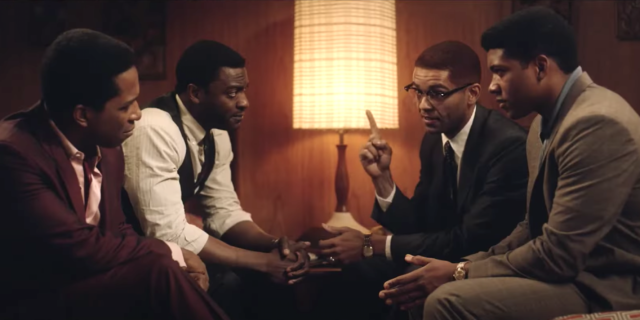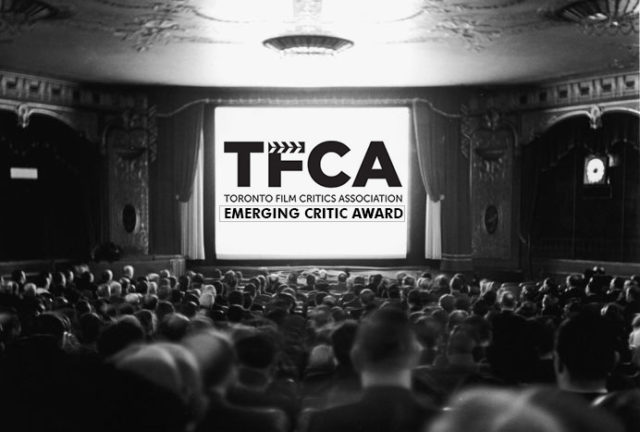Reviews include Deadpool & Wolverine, Doubles, and Mountain Queen: The Summits of Lhakpa Sherpa.
TFCA Friday: Week of Jan. 15
January 15, 2021

Welcome to TFCA Friday, a weekly round-up of film reviews and articles by TFCA members.
In Release this Week
The 2ND (dir. Brian Skiba)
“Cheesy and corny clichéd as the film is, The 2ND is, given what it is, still entertaining for pretending to be the number 1 action film of the year, as if all the clichéd parts were done for the very first time,” admits Gilbert Seah at Afro Toronto.
Acasa, My Home (dir. Radu Ciorniciuc)
“Though billed a documentary, it is more like a [dramatic] feature film based on the true story of the family re-enacted by the family members themselves, as it is obvious most of the action does not take place as it happens,” observes Gilbert Seah at Afro Toronto. “No complaint here, as the story is still told effectively, perhaps even more so.”
“You really get to know the family and become interested in what happens to them. This is a humanistic, finely constructed and shot debut feature,” writes Marc Glassman at Classical FM.
“Ciorniciuc uses close-up camerawork to let expressive faces tell the story, proof of the remarkable access he had for this film as he grew close to the family, especially considering Gică’s level of mistrust or anything related to his reviled civilization,” observes Linda Barnard at Original Cin.
Climate of the Hunter (dir. Mickey Reece)
“[C]ould have done with more humour – black humour that would suit the situation at hand,” suggests Gilbert Seah at Afro Toronto.
“A sensuous, trippy mood that successfully seduces – at least for those who can easily settle into these kinds of campy experiments. (Guilty!),” admits Barry Hertz at The Globe and Mail.
“To be sure, Climate of the Hunter is an oddball outing, a melodrama disguised as a horror-thriller with not much horror and not many thrills,” writes Thom Ernst at Original Cin, explaining why he watched the film three times. “And if, by the end of the final act, you’re shaking your head, mumbling, ‘Wait…what?’ you won’t be alone.”
Hunted (dir. Vincent Paronnaud)
“A well-worn tale of predator hunting prey, but given many uplifting surprises making it a standout film in the slasher genre,” writes Gilbert Seah at Afro Toronto.
Locked Down (dir. Doug Liman)
“The circumstances are preposterous, but – as we’re constantly being reminded – these are unprecedented times,” concedes Norm Wilner at NOW Toronto.
“Turns out that there is a reason most films worth watching take longer than 10 months to conceive of, write, pitch, cast, shoot, edit and release,” sighs Barry Hertz at The Globe and Mail.
“And so with Locked Down we have a romance, a comedy, a heist movie and a thriller that also feels like a time capsule, from a time before we knew (not that we really do now) where this COVID thing was going,” writes Chris Knight at the National Post, with a few extra words from Mr. Dickens.
“Anne Hathaway, I apologise for dissing you so hard for your work in The Witches,” offers Anne Brodie at What She Said. “You are perfection as a perfectionist finally forced to face reality and I beg your forgiveness.”
Love, Sarah (dir. Eliza Schroeder)
“First-time feature director and co-writer Eliza Schroeder crafts a story that is easy on the eyes, none too taxing on the mind, and guaranteed to make you hungry,” advises Chris Knight at the National Post.
“Love Sarah is comfort food for movie buffs,” nibbles Pat Mullen at That Shelf.
“If you can see past the rows and rows of stunning baked goods, and it’s a challenge, you’ll find a sweet, gentle and hopeful take on mourning and moving ahead and the possibility of recovery from loss,” notes Anne Brodie at What She Said.
“A sweet as dessert film, pleasant and entertaining in all ways,” noshes Gilbert Seah at Afro Toronto.
Make Up (dir. Claire Oakley; Jan. 19)
“Gorgeous cinematography celebrates nature’s beauty and threat, as the camera gazes at people not always fully visible, through windows, grasses, sandhills, adding to Molly’s emotional isolation,” writes Anne Brodie at What She Said.
“Oakley’s film might be frustrating to come as her loose narrative of Ruth’s coming-of-age journey seems to be meandering without direction,” admits Gilbert Seah at Afro Toronto. “But it is for this fact, that her film stands out.”
MLK/FBI (dir. Sam Pollard)
“Some documentaries preserve the past in amber,” reflects Norm Wilner at NOW Toronto. “Others explore the way it echoes into the present. MLK/FBI does the latter, drawing an undeniable arrow from Hoover’s tactics against King to the undermining of contemporary Black activists’ legitimacy and the attacks on Black Lives Matter movement. Half a century later, the tactics haven’t changed at all.”
“King and Hoover are long gone now. So are the Sixties,” writes Marc Glassman at POV Magazine. “But Pollard’s lucidly intelligent film shows what happened then: a fatal situation in which a Black man confronted the white establishment. It doesn’t take a stretch to point out that Pollard’s film has relevance today.”
My Little Sister (dir. Stéphanie Chuat and Véronique Reymond)
“This is Lisa’s story and Hoss keeps you guessing with a subtle performance that stays on the verge of something for much of the movie,” observes Kevin Ritchie at NOW Toronto.
“In Hoss’s hands, Lisa is both warm in her devotion to Sven and cold in the impulses that drive her,” writes Pat Mullen at That Shelf.
“The film is a sombre piece of work, not surprising given the film’s content of lingering death,” notes Gilbert Seah at Afro Toronto.
News of the World (dir. Paul Greengrass)
“Stylistically, [Greengrass] has shifted his usually frenetic docudrama style to cinematographer Dariusz Wolski’s more classic framing in the external daytime scenes,” notes Liam Lacey at Original Cin. “Town scenes use more handheld cameras, and the nights, where Kidd performs by gaslight lanterns, give the scenes rich textures of light and shadow.”
“Hanks, having played legendary journalist Ben Bradlee in The Post, not to mention storyteller Walt Disney (Saving Mr. Banks), straight-shooter James B. Donovan (Bridge of Spies) and no less a truth-teller than Fred Rogers (A Beautiful Day in the Neighborhood), seems uniquely positioned to argue on the side of facts,” notes Chris Knight at the National Post.
NEWS OF THE WORLD (⭐⭐1/2): Tom Hanks reteams with director Paul Greengrass ("Captain Phillips") for the actor's first western — and it feels like so many other westerns. Loads of grit, not much gusto in this benevolent oater about an orphan needing a family and safe passage. pic.twitter.com/1Ktp406cTP
— Peter Howell 🖊 (@peterhowellfilm) December 27, 2020
“But it’s frustrating that Greengrass…never expresses more than a superficial understanding of the movie’s themes, and indeed often shoves them aside for unnecessary chases or shootouts that goose the movie’s energy without adding anything to the story,” argues Norm Wilner at NOW Toronto.
One Night in Miami (dir. Regina King)
“Tight quarters offer an ideal frame to look inside the hearts and souls of these men who became major figures in American culture and history,” raves Anne Brodie at What She Said. “King’s elegant work builds to an emotional crescendo you won’t forget, a stunning tour-de-force on every level.”
“King has an eye and ear not always found in rookie directors, no doubt aided by her long experience as an actor, including her Oscar-winning role as mother of a wrongfully convicted man in Barry Jenkins’ If Beale Street Could Talk,” observes Peter Howell at the Toronto Star.
“As momentum builds its nuance, boldness and intelligence shines,” says Jason Gorber at That Shelf.
“One Night in Miami is a powerful imagining of one of the most intriguing private gatherings in contemporary history,” notes Thom Ernst at Original Cin. “And though we are merely a fly-on-the-wall, eavesdropping on a conversation that is likely far more electrifying than the actual discussion, it’s still a remarkable experience.”
“It’s a sharp, confident picture, a movie that lets you enjoy the characters’ moment-to-moment sparring (verbally and otherwise) but never forgets their stature,” writes Norm Wilner at NOW Toronto.
Outside the Wire (dir. Mikael Hafstrom)
“Stupid is as stupid does. And Outside the Wire does a lot of stupid,” pans Chris Knight at the National Post.
“Cheaply shot, poorly acted, and with a plot that strip-mines everything from RoboCop to District 9 to Eye in the Sky to even the beyond-dumb jet-fighter-goes-rogue movie Stealth, Hafstrom’s feature might be fine background noise to fold your laundry to,” zings Barry Hertz at The Globe and Mail.
“A solid action time-waster, with a good cast and a fresh look at an otherwise over-familiar futuristic setting that should please action fans of all genres,” offers Gilbert Seah at Afro Toronto.
Promising Young Woman (dir. Emerald Fennell)
“Mulligan is mesmerizing as a broken avenger who’s deleted her humanity in the service of her mission, and Fennell’s casting instincts are unnervingly good, rolling out a stream of warm, charming actors as people with the potential to do monstrous harm,” says Norm Wilner at NOW Toronto. “But there’s a yawning chasm between what Promising Young Woman thinks it’s doing, and what it actually accomplishes.”
“The third-act thriller conclusion is so inconsistent that it feels like an alternative ending to the real movie,” suggests Liam Lacey at Original Cin. “It should be a conversation starter, though it won’t necessarily be a pleasant conversation.”
PROMISING YOUNG WOMAN (⭐⭐⭐): Emerald Fennell's
disquieting tale of predatory males receiving sexual retribution is more bleak drama than the dark comedy it's being billed as. But there's no doubting the power and fury of Carey Mulligan's Cassie, dispenser of rough justice. pic.twitter.com/eChPxGPl9r— Peter Howell 🖊 (@peterhowellfilm) January 15, 2021
“When’s the last time we got a film as dark, sexy, and dangerous as Promising Young Woman?” asks Pat Mullen at That Shelf. “Emerald Fennell throws down the glove: anyone else making their debuts this year best be ready for the challenge.”
The Reason I Jump (dir. Jerry Rothwell)
“What is most remarkably illustrated in the film is the unfaltering love the parents have for their children,” observes Gilbert Seah at Afro Toronto.
“Rothwell demands more from us than our admiration,” argues Thom Ernst at Original Cin. “Admiration is easy; what’s difficult, and what Rothwell so effectively inspires, is a recognition that even a life we might label as compromised can be rich and fulfilling.”
At POV Magazine, Pat Mullen speaks with director Jerry Rothwell and author David Mitchell about their innovative and nuanced approach to representing the experiences of people with autism.
“Through editing, the way that an autistic personality absorbs the world—one by one rather than as a whole—is shown cinematically as objects are seen singularly, with appropriate sounds in effect per sequence,” writes Marc Glassman at Classical FM.
TV – WandaVision, true crime, and Tiger!
At The Globe and Mail, Barry Hertz wonders how the first entry in the Marvel Televisual Universe bodes for big budget action stuff in pandemic times: “Three episodes in, though, it’s difficult to say whether WandaVision is a success – whether in pulling off this particular kind of medium-specific satire-lite story, translating the overall MCU sensibilities to the small screen, pushing forward the long-running Avengers arc in a post-Endgame narrative, or helping Disney boost its bottom line to ensure many more years of ancillary franchises.”
Gilbert Seah at Afro Toronto, meanwhile, says WandaVision is “welcome nostalgia, inventive, funny and addictive.”
At What She Said, Anne Brodie advises going along for the ride: “WandaVision carries multigenerational appeal, the nostalgia of earlier Marvel and those silly old sitcoms, the meaning and purpose of superpowers, the impossibility of being one’s true self in order to serve the greater good. WandaVision is an act of extraordinary imagination, rooted in the complex mythology of Marvel, designed to set nerds’ pulses pounding.” Brodie also suggests that audiences will find a welcome escape in the new season of Frankie Drake Mysteries, saying, “The fun never ends on this bright and breezy series.”
Jim Slotek at Original Cin agrees on WandaVision, noting, “If WandaVision causes over-serious genre fans to suffer the vapours, well, that’s a bonus. The series, in the three episodes I’ve previewed, is so different from what we’ve come to expect from super-heroes that it might serve as a gateway drug for people who’ve steadfastly resisted them so far.”
At the National Post, Chris Knight says not to worry if you find WandaVision a head-scratcher: “Constant confusion is not the best state of mind for most episodic television, but WandaVision has me hooked. There’s just enough mystery to keep audiences following along, searching for clues, while a fairly straight sitcom plot plays out in the foreground of each episode.”
“[T]he the not knowing, honestly, feels great,” agrees Norm Wilner at NOW Toronto. “The Marvel movies aren’t known for their unpredictability: since 2008, they’ve been pretty open about their overarching narratives and stakes, both from film to film and from grandmaster Kevin Feige’s carefully structured phases.”
For Marvel’s TV Guide, Jason Gorber profiles what’s on the tube:
Check out this exclusive look at our Wanda-full 🌀 Vision-ary 💥 TV Streaming Guide, inspired by the retro feel of Marvel Studios’ #WandaVision. Mark your calendars – the Original Series starts streaming tomorrow on #DisneyPlus. (1/2) pic.twitter.com/XHrA9Pntx5
— Marvel Studios Canada (@MarvelStudiosCA) January 14, 2021
Audiences looker for something more, er, realistic than WandaVision might be disappointed by the true crime series Night Stalker: “Night Stalker is most effective as a classic procedural, going deep into how Ramirez defied the profile of serial killers up to that point, leaving few telltale signs for investigators to connect into a pattern, and for the sense of all-encompassing fear it captures,” writes Kevin Ritchie at NOW Toronto. “Unfortunately, [Tiller] Russell succeeds in the latter case by overemphasizing bland horror visuals to underscore the testimonies of his interview subjects.”
At POV, Pat Mullen tees up Tiger: “The first 90 minutes of Tiger are less of a tease to the naughty bits and more of an engrossing overview into the making of an icon. Much like Ezra Edelman’s OJ Simpson doc series OJ: Made in America, Tiger bides its time in getting to the meat of the story. Like OJ, it builds a sturdy backstory that combines the USA’s explosive racial politics, the intoxicating allure of celebrity, and the charismatic star power and awesome talent of a sports icon who captivated audiences.”
https://www.youtube.com/watch?v=CX3UGfZre9A
Call the Midwives
Last week’s round-up featured Pieces of a Woman, which mostly drew raves for its opening sequence, which featured a birth scene captured in one intense 20-minute long take. At NOW Toronto, Kevin Ritchie and Radheyan Simonpillai consult a panel of midwives to learn more about what the scene does and doesn’t get right about their practice.
From the Archive: The Barbarian Invasions
As the Oscar race for Best International Feature heats up and Trump scores his second impeachment following the failed insurrection in Washington last week, let’s revisit Canada’s only winner for the Best Foreign Language Film Oscar: Denys Arcand’s The Barbarian Invasions. The recent events are easily fodder for another entry in the director’s series of films about the downfall of the America.
Here is Arcand in conversation with Peter Howell for Take One, speaking on his film at the 2003 Cannes Film Festival:
“The American Empire is the world’s absolute ruler,” [notes Arcand.] “As such, it will have to constantly push back the stream of barbarian attacks. The first that succeeded, 9/11 struck at the empire’s heart. It’s the first of many more to come. I feel more and more out of sync with today’s reality. The most common sign of getting old, I guess. The constant acceleration of life and the media roar are repulsive to me. I have little interest for digital films. I love dialogues and actors. I believe that countries are a vanishing species. To the future generations, the notion of borders will be almost irrelevant. That’s where Remy’s son is at already. There will be American citizens on one side and non—resident aliens on the other. Seen from Washington, the French, the Bulgarians or the Japanese are one and the same thing: barbarians.”
Strong words for such an apparently happy man, but Arcand makes no apologies for how he feels. His views about the terrorist attacks of 9/11 are so strong, he inserts into Les Invasions terrifying footage of one of the hijacked jets crashing into the World Trade Center. It’s from a newsreel he obtained from Radio—Canada, which had been shot by a Quebec architect who happened to be visiting New York on that terrible day. If anything, Arcand is resigned to the way the world has changed; he and his characters have all pragmatically decided to stop fighting and instead just enjoy what little time there is left for them on earth.

Now Accepting Submissions – 2021 TFCA Emerging Critic Award!
See the instructions and application details here. Deadline is February 3rd at 5:00 pm.



